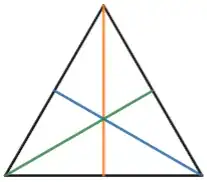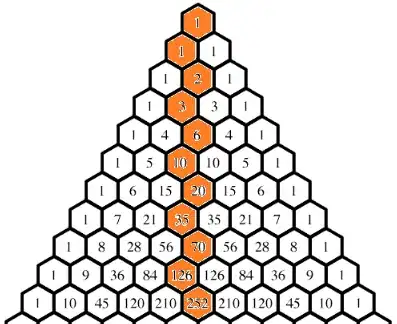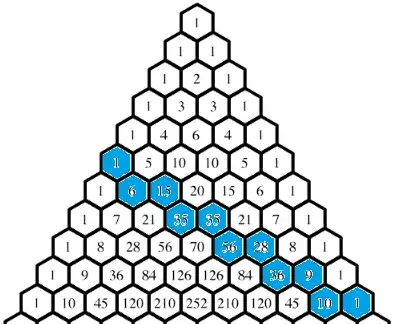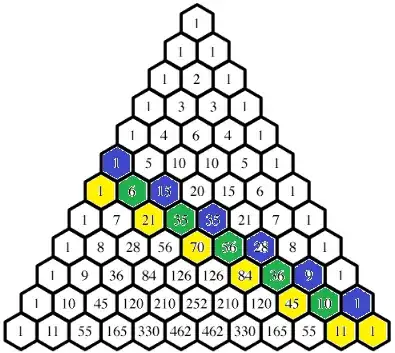On Pascal's triangle with any number of rows, draw the three medians.
For each median, calculate the product of the numbers that zig-zag along that median.
The three products are always equal! (proof below)
Note that, on the vertical median, every other number is either just to the left, or just to the right of the median; it makes no difference. On the oblique medians, every other number is just below the median (this rule applies when the number of rows is even or odd).
Here is an example with a triangle with $10$ rows (the top $1$ is row $0$):
$1\cdot 1\cdot 2\cdot 3\cdot 6\cdot 10\cdot 20\cdot 35\cdot 70\cdot 126\cdot 252=560105280000$
$1\cdot 6\cdot 15\cdot 35\cdot 35\cdot 56\cdot 28\cdot 36\cdot 9\cdot 10\cdot 1=560105280000$
This is such a simple result, so I wonder if there is an intuitive explanation. My question is:
Is there an intuitive explanation for this result?
To give an idea of what I mean by "intuitive explanation", here are some examples:
- The sum of the numbers in the $n$th row is $2^n$, because $\binom{n}{0}+\binom{n}{1}+\binom{n}{2}+\cdots+\binom{n}{n}=(1+1)^n=2^n$.
- $\sum_{k=0}^n \binom n k ^2 = \binom {2n} n$ has an intuitive combinatorial proof.
- In the left-justified Pascal's triangle, any square matrix that shares a border with the left edge of the triangle has determinant $1$; this has an intuitive proof.
My non-intuitive proof
I prove the case when the number of rows is even, $2n$. The proof with an odd number of rows is very similar.
$P_v=$ product along vertical median $=\prod\limits_{k=1}^n\binom{2k-1}{k-1}\binom{2k}{k}$
$P_o=$ product along oblique median $=\prod\limits_{k=1}^n\binom{n+k}{2k-1}\binom{n+k}{2k}$
$\begin{align} \dfrac{P_v}{P_o}&=\prod\limits_{k=1}^n\dfrac{(2k-1)!^2 (2k)!^2 (n+1-k)!(n-k)!}{(k-1)!k!^3 (n+k)!^2}\\ &=\prod\limits_{k=1}^n \dfrac{(2k-1)!^2(2k)!^2}{k!^2 (n+k)!^2}\\ &=\prod\limits_{k=1}^n \dfrac{(2k)!^4}{k!^2 (n+k)!^2 (2k)^2}\\ &=\dfrac{(2!4!6!\dots (2n)!)^4}{(1!2!3!\dots n!)^2((n+1)!(n+2)!(n+3)!\dots (2n)!)^2(2\cdot 4\cdot 6\dots (2n))^2}\\ &=\dfrac{(2!4!6!\dots (2n)!)^2}{(1!3!5!\dots (2n-1)!)^2 (2\cdot 4\cdot 6\dots(2n))^2}\\ &=1 \end{align}$
Context
I have been playing with Pascal's triangle, investigating some of its mysterious, geometrical and humourous properties.



